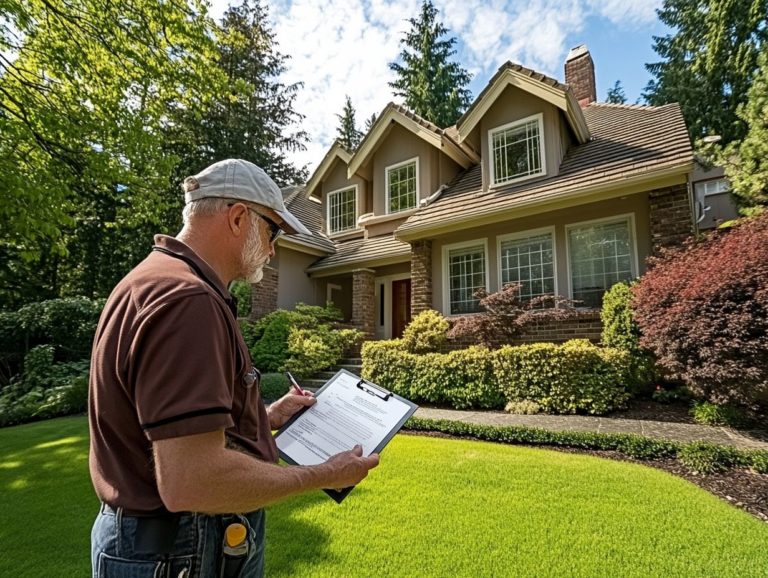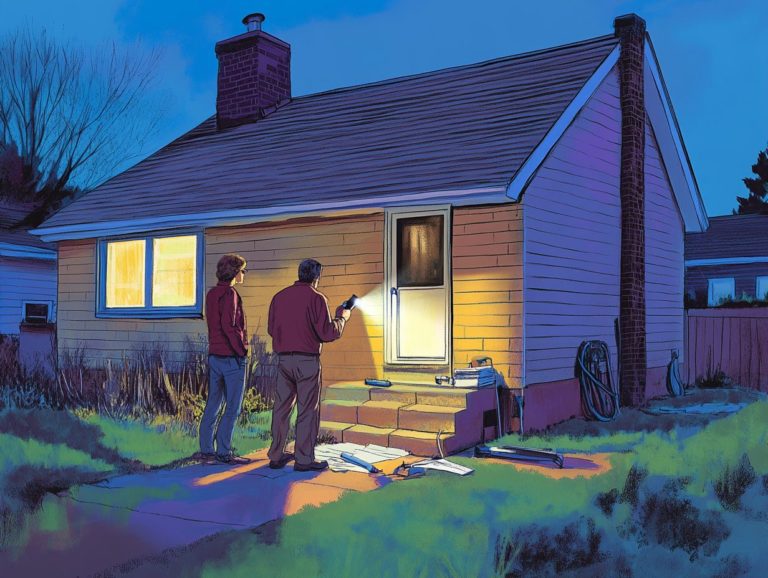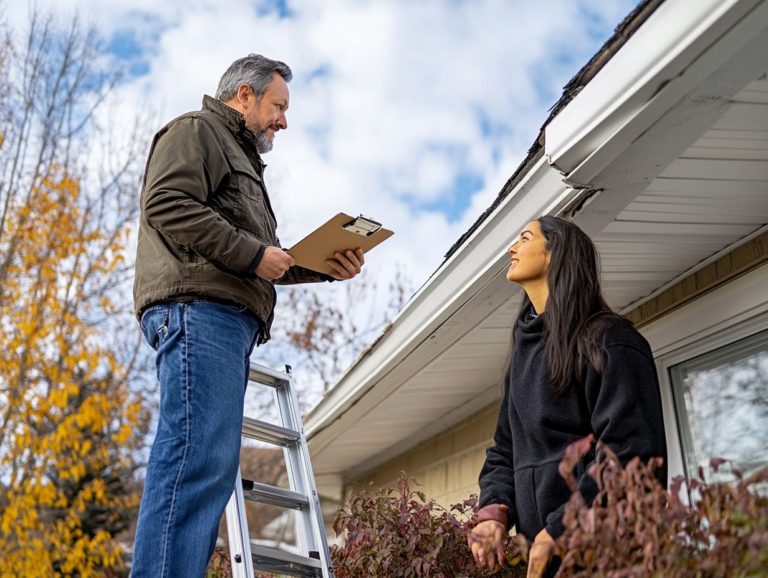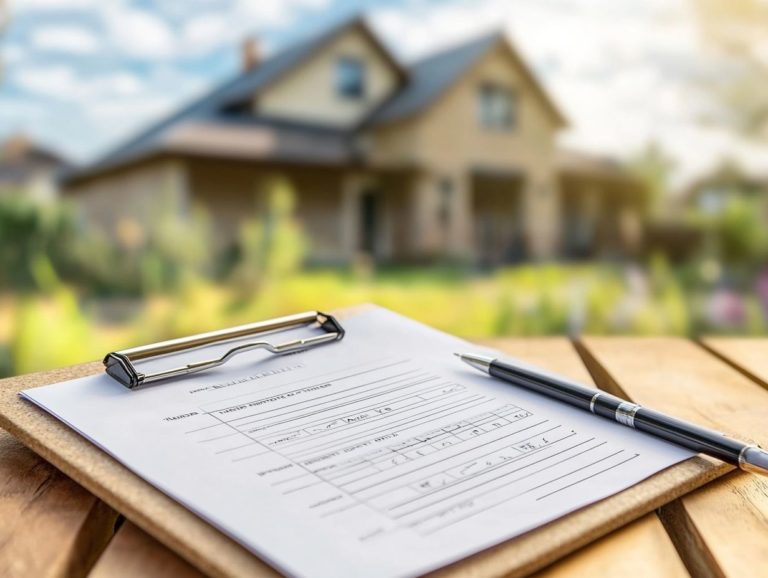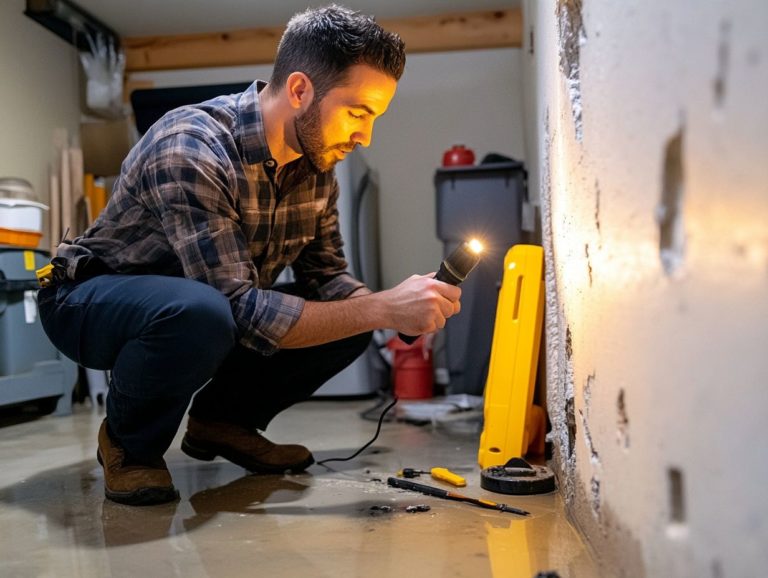How to Choose a Home Inspector
When you’re buying or selling a home, grasping the property’s condition becomes paramount. A home inspector is your trusted ally in this endeavor, delivering a comprehensive analysis of the structure and systems within the house.
This article delves into the responsibilities of home inspectors. It highlights the significance of inspections and what to consider when selecting the right professional. You’ll also find essential questions to ask, how to prepare for an inspection, and tips for interpreting the findings.
Whether you’re a first-time buyer or a seasoned homeowner, this guide equips you with the knowledge needed to make informed decisions, ensuring that you navigate the process with confidence and clarity.
Contents
- Key Takeaways:
- What is a Home Inspector?
- Why is a Home Inspection Important?
- What Makes a Great Home Inspector?
- Questions to Ask a Home Inspector
- Preparing for a Home Inspection
- Interpreting the Inspection Report
- Preguntas Frecuentes
- Qu es un inspector de casas y por qu es importante elegir al adecuado?
- C mo encuentro un inspector de casas de buena reputaci n?
- Qu calificaciones debo buscar en un inspector de casas?
- Qu debo esperar durante una inspecci n de casas?
- Cu nto cuesta una inspecci n de casas?
- Puedo asistir a la inspecci n de la casa?
Key Takeaways:
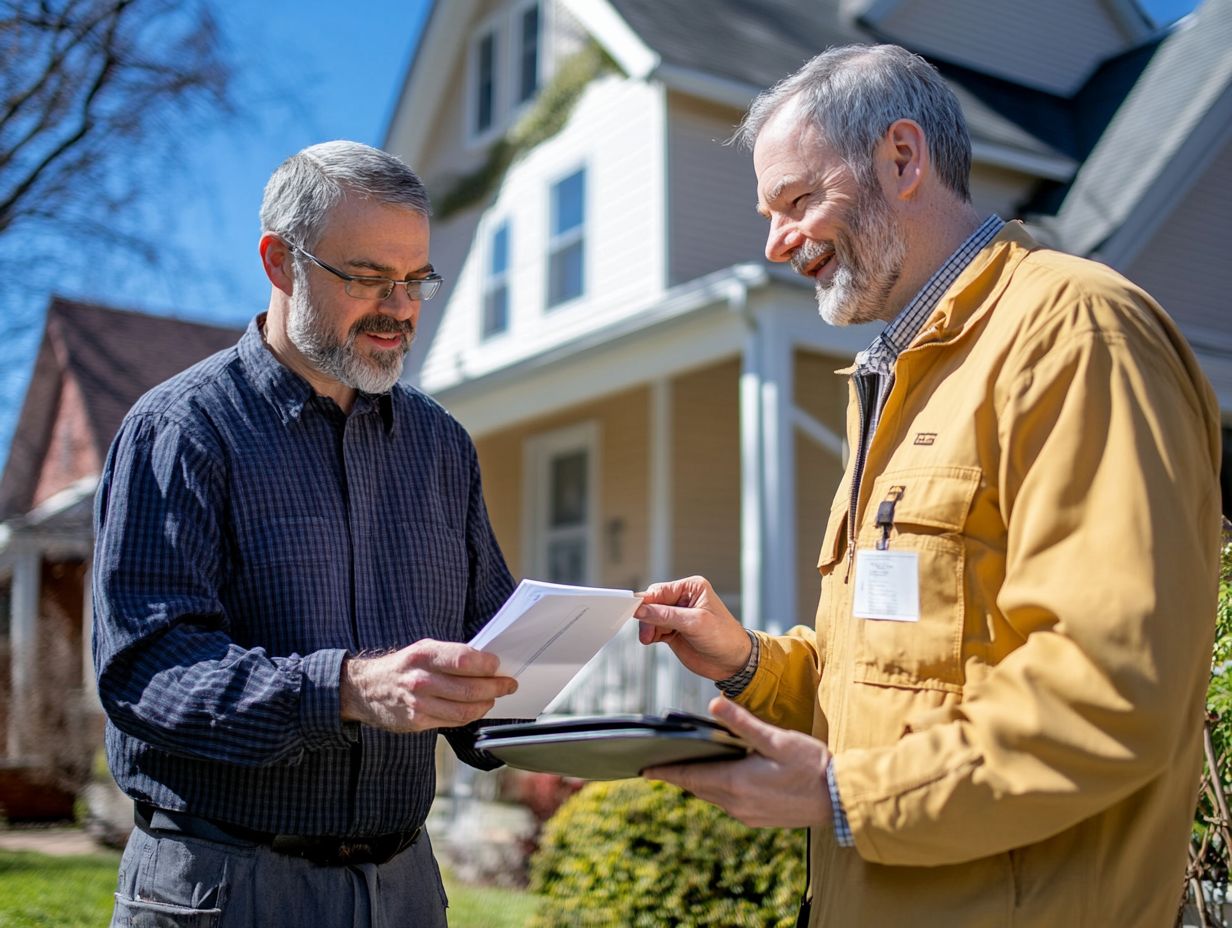
Don’t risk your investment! Always hire a certified home inspector for a thorough property check. Skipping a home inspection can lead to potential risks and costly repairs in the long run. To ensure you make the right choice, learn how to choose the best home inspector for your needs by asking important questions and understanding the findings in the inspection report.
What is a Home Inspector?
A home inspector is a trained professional dedicated to assessing the condition of a property before you make that significant purchase. To ensure you select the best option, it’s crucial to understand how to choose the right inspector for your home. They ensure you’re fully informed about any structural or mechanical issues that could affect your investment.
Home inspectors use advanced technology like thermal imaging and infrared thermography. This helps them deliver detailed reports that uncover hidden problems, such as pest infestations and mold within the walls.
This thorough evaluation helps you make informed decisions about your future home, safeguarding your investment every step of the way.
Role and Responsibilities
The primary role of a home inspector is to conduct a thorough evaluation of a property, focusing on identifying mechanical and structural issues that could impact the safety and integrity of your home.
This process involves examining critical systems such as the HVAC, plumbing, and electrical components. The inspector meticulously checks for proper function and potential issues.
While on-site, paying attention to detail is crucial. A rushed inspection can easily overlook significant problems that might later surprise you with unexpected costs.
Once the evaluation is complete, a comprehensive inspection report is generated. This report provides you with a clear understanding of both essential repairs and minor maintenance tasks.
This report serves not only as a helpful guide for new homeowners but also equips you with the information needed to make informed decisions about your investment.
Why is a Home Inspection Important?
A home inspection is vital! It uncovers hidden issues that could turn your dream home into a money pit.
This thorough examination safeguards you against unforeseen expenses and potential safety hazards after the purchase. It ensures you make a well-informed investment in your new home.
Potential Risks of Skipping an Inspection
Skipping a home inspection can expose you to significant financial and safety risks. You might overlook critical hidden problems, such as structural issues, mechanical concerns, or even pest infestations.
Deciding to forgo this essential step often leads to unexpected repair costs that can escalate quickly. For example, mold growth hidden within walls can pose severe health risks and result in extensive repair costs.
You could find yourself grappling with faulty wiring or plumbing just months after your purchase. Facing costs that could have been easily avoided highlights the importance of ensuring a home s integrity and safety before finalizing any deals, ultimately safeguarding both your investment and well-being.
What Makes a Great Home Inspector?

When you’re on the hunt for a reliable home inspector, it’s crucial to evaluate their experience and credentials.
These elements greatly influence the quality of inspection services they can offer, guaranteeing a thorough examination and meticulous attention to detail.
Experience and Credentials
A qualified home inspector should have relevant inspection credentials from reputable organizations like the American Society of Home Inspectors or the International Association of Certified Home Inspectors. For more guidance, check out this resource on how to choose a home inspector in your area, which highlights their commitment to upholding industry standards and assures you of their professionalism.
These credentials indicate that the inspector has undergone rigorous training and testing, reflecting their dedication to continuous education in an ever-evolving field. Choosing inspectors who are members of professional groups comes with significant benefits; these professionals adhere to stringent ethical guidelines and industry standards.
This affiliation guarantees a commitment to quality and reliability, giving you peace of mind. Inspectors with such credentials stay updated on the latest practices and technologies, ensuring they provide thorough assessments that can reveal potential issues. Don’t miss out on protecting your investment!
Thoroughness and Attention to Detail
Thoroughness and attention to detail are essential qualities for any reliable home inspector. These traits ensure every aspect of the home is meticulously examined, resulting in a comprehensive report for you as the buyer.
By carefully assessing every nook and cranny of the property, the inspector can uncover potential issues that might escape notice during a quick look. This diligent scrutiny doesn’t just spotlight structural or mechanical problems that could be costly down the line; it also provides you with invaluable peace of mind.
A detailed inspection report becomes a critical tool, offering insights that enable you to make informed decisions about your investment. This thorough approach boosts your confidence in one of life’s biggest purchases!
Questions to Ask a Home Inspector
When you’re interviewing potential home inspectors, it’s essential to ask thoughtful questions that reveal their expertise and the depth of their reporting. Knowing how to choose the best home inspector will influence your negotiation strategies during the home buying process.
Important Inquiries to Make
Requesting sample reports from a home inspector can offer you invaluable insights into their inspection services. This highlights their thoroughness, attention to detail, and communication style when conveying findings to clients.
You should ask about customer reviews to assess the inspector’s reliability and level of customer service. These reviews can uncover patterns in their work habits and how responsive they are to client concerns.
Obtaining detailed quotes in advance is crucial for understanding the range of services included and ensuring no hidden fees lurk in the shadows.
Collectively, these inquiries enable you to make well-informed decisions, ensuring that the inspector you choose aligns with your expectations and instills confidence throughout the home-buying journey. For more guidance, refer to how to choose the right home inspector for you.
Preparing for a Home Inspection

Proper preparation for a home inspection is crucial for you as a home buyer. It equips you with the knowledge of what to expect during the process and enhances your ability to communicate effectively with the inspector.
What to Expect and How to Prepare
As a home buyer, you should anticipate a thorough examination of the property’s condition during the home inspection. It’s wise to prepare by gathering your questions and ensuring open communication with the inspector.
This evaluation typically covers essential areas such as the roof, plumbing, electrical systems, and heating, ventilation, and air conditioning (HVAC) systems. This enables the inspector to pinpoint any potential issues that may need your attention.
By discussing your specific concerns with the inspector, you can gain valuable insights into the property’s overall condition and understand any troubleshooting that might be necessary. Asking questions during both the inspection and the report review will ensure that no detail is overlooked.
Ultimately, this proactive communication enables you to make better-informed decisions as you move forward with one of the most significant investments of your life.
Interpreting the Inspection Report
Interpreting the inspection report is an essential task for you as a homebuyer. This document offers valuable insights into the property’s condition and plays a pivotal role in guiding your next steps during the negotiation process.
Understanding the Findings and Next Steps
Understanding the findings in your inspection report is crucial as it guides you in determining necessary repairs or negotiations before finalizing your purchase. Navigating the complexities of a property’s condition can feel overwhelming. However, grasping these findings enables you to spot potential red flags, such as structural issues or outdated systems, that may need immediate attention.
It s perfectly normal to feel inundated by the details. Breaking down each section of the report into manageable components can help clarify your priorities. Misinterpretations can lead to costly oversights, making thorough reporting essential.
This comprehensive documentation not only informs your repair decisions but also enhances the negotiation process. It enables you to make strategic offers based on factual evidence. Ultimately, this approach fosters more confident and knowledge-based decision-making.
Preguntas Frecuentes
Qu es un inspector de casas y por qu es importante elegir al adecuado?

Un inspector de casas es un profesional capacitado que revisa la condici n de una casa o propiedad. Elegir al inspector adecuado es importante porque sus hallazgos pueden impactar significativamente tu decisi n de comprar una casa y afectar tu inversi n general.
C mo encuentro un inspector de casas de buena reputaci n?
Comienza pidiendo recomendaciones a amigos, familiares o agentes inmobiliarios. También puedes investigar en línea y buscar cómo elegir el inspector de viviendas adecuado que estén reconocidos oficialmente y tengan buenas críticas de clientes anteriores.
Qu calificaciones debo buscar en un inspector de casas?
Busca un inspector que esté licenciado y certificado por una organización reconocida, como la Asociación Internacional de Inspectores de Casas Certificados (InterNACHI) o la Sociedad Americana de Inspectores de Casas (ASHI). Además, considera cómo seleccionar un inspector de viviendas para tus necesidades y asegúrate de que tengan experiencia y conocimiento en el tipo específico de propiedad que te interesa.
Qu debo esperar durante una inspecci n de casas?
Una inspecci n de casas t picamente toma unas pocas horas e involucra un examen exhaustivo del interior y exterior de la propiedad, incluyendo la estructura, sistemas y componentes. El inspector proporcionar un informe detallado de sus hallazgos, incluyendo cualquier problema potencial o preocupaciones de seguridad.
Cu nto cuesta una inspecci n de casas?
El costo de una inspecci n de casas puede variar dependiendo de la ubicaci n, tama o y edad de la propiedad. En promedio, una inspecci n b sica puede costar entre $300 y $500. Recuerda, invertir en una buena inspecci n es proteger tu futuro hogar.
Puedo asistir a la inspecci n de la casa?
S , se recomienda encarecidamente que asistas a la inspecci n de la casa. Esto te permitir hacer preguntas, abordar cualquier preocupaci n y obtener una mejor comprensi n de la condici n de la propiedad. Es f cil aprender sobre el mantenimiento y cuidado de la propiedad!


